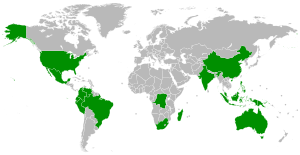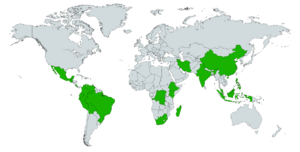Megadiverse countries facts for kids
Megadiverse countries are special places on Earth that are home to a huge variety of plants and animals. They have lots of different species, and many of these species are found nowhere else in the world! An organization called Conservation International first pointed out 17 of these amazing countries in 1998. Many of them are in warm, wet areas near the equator, like tropical or subtropical regions.
The word 'megadiverse' means having 'mega' (a lot of) 'diversity' (variety) of life. This is also known as biodiversity. For a country to be called megadiverse, it must have a very high number of unique species. These are called endemic species, meaning they live only in that specific country. A megadiverse country needs to have at least 5,000 types of plants that are found nowhere else. It also needs to be next to the ocean.
In 2002, Mexico helped create a special group called the Like-Minded Megadiverse Countries. This group includes countries that are rich in different kinds of life and also have a lot of traditional knowledge about nature.
Contents
What are the Megadiverse Countries?
There are 17 countries that are officially called megadiverse. They are:
 Australia (Australia)
Australia (Australia) Brazil (Brazil)
Brazil (Brazil) China (China)
China (China) Colombia (Colombia)
Colombia (Colombia) Democratic Republic of the Congo (Democratic Republic of the Congo)
Democratic Republic of the Congo (Democratic Republic of the Congo) Ecuador (Ecuador)
Ecuador (Ecuador) India (India)
India (India) Indonesia (Indonesia)
Indonesia (Indonesia) Madagascar (Madagascar)
Madagascar (Madagascar) Malaysia (Malaysia)
Malaysia (Malaysia) Mexico (Mexico)
Mexico (Mexico) Papua New Guinea (Papua New Guinea)
Papua New Guinea (Papua New Guinea) Peru (Peru)
Peru (Peru) Philippines (Philippines)
Philippines (Philippines) South Africa (South Africa)
South Africa (South Africa) United States (United States of America)
United States (United States of America) Venezuela (Venezuela)
Venezuela (Venezuela)
Countries with the Most Biodiversity in 2022
Scientists often measure how much biodiversity a country has by counting different types of animals and plants. Here are some of the top countries with the most known species in 2022:
| Country | Birds | Amphibians | Fish | Mammals | Reptiles | Vascular Plants | Biodiversity Index |
|---|---|---|---|---|---|---|---|
| 1,816 | 1,141 | 4,738 | 693 | 847 | 34,387 | 512.34 | |
| 1,723 | 383 | 4,813 | 729 | 773 | 19,232 | 418.78 | |
| 1,863 | 812 | 2,105 | 477 | 634 | 24,025 | 369.76 | |
| 1,285 | 540 | 3,476 | 622 | 554 | 31,362 | 365.84 | |
| 1,105 | 411 | 2,629 | 533 | 988 | 23,385 | 342.47 | |
| 725 | 245 | 4,992 | 355 | 1,131 | 19,324 | 337.18 | |
| 1,861 | 655 | 1,583 | 490 | 510 | 19,812 | 330.12 | |
| 1,212 | 446 | 2,601 | 440 | 715 | 15,000 | 301.63 | |
| 1,629 | 659 | 1,111 | 392 | 492 | 18,466 | 291.58 | |
| 844 | 326 | 3,081 | 531 | 556 | 15,500 | 280.13 |
Working Together: The Cancún Initiative
On February 18, 2002, leaders and environmental experts from several countries met in Cancún, Mexico. These countries included Brazil, China, Colombia, Costa Rica, India, Indonesia, Kenya, Mexico, Peru, the Philippines, South Africa and Venezuela.
They decided to form a group called the Group of Like-Minded Megadiverse Countries. This group helps them talk and work together. Their main goal is to protect and use their amazing biodiversity in a smart, long-lasting way. They also encouraged other countries to join important agreements like the Convention on Biological Diversity.
The group agreed to meet regularly to discuss their plans. The country that hosts the meeting also acts as the group's secretary until the next meeting. This helps them keep working together and reach their goals. Later, in 2010, Guatemala and Iran also joined this important group.
Current Members of the Like-Minded Megadiverse Countries
Here are the countries that are currently part of this group:
 Bolivia (Bolivia)
Bolivia (Bolivia) Brazil (Brazil)
Brazil (Brazil) China (China)
China (China) Colombia (Colombia)
Colombia (Colombia) Costa Rica (Costa Rica)
Costa Rica (Costa Rica) Democratic Republic of the Congo (Democratic Republic of the Congo)
Democratic Republic of the Congo (Democratic Republic of the Congo) Ecuador (Ecuador)
Ecuador (Ecuador) Ethiopia (Ethiopia)
Ethiopia (Ethiopia) Guatemala (Guatemala)
Guatemala (Guatemala) India (India)
India (India) Indonesia (Indonesia)
Indonesia (Indonesia) Iran (Iran)
Iran (Iran) Kenya (Kenya)
Kenya (Kenya) Madagascar (Madagascar)
Madagascar (Madagascar) Malaysia (Malaysia)
Malaysia (Malaysia) Mexico (Mexico)
Mexico (Mexico) Peru (Peru)
Peru (Peru) Philippines (Philippines)
Philippines (Philippines) South Africa (South Africa)
South Africa (South Africa) Venezuela (Venezuela)
Venezuela (Venezuela)
See also
 In Spanish: Países megadiversos para niños
In Spanish: Países megadiversos para niños



